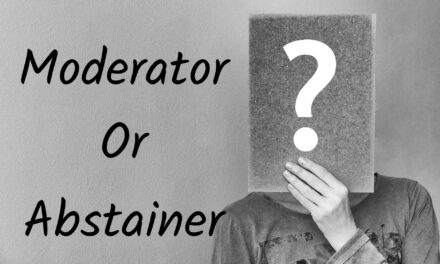The concept of “changing your identity to change your habits” isn’t anything new. James Clear talks about it in his book “Atomic Habits”, and I have heard it on lots of podcasts and numerous other places. I wanted to talk about it though because it absolutely has to do with overcoming a sugar or food addiction. You can stop eating sugar by making an identity shift.
What does it mean to “change your identity”?
When I say “change your identity”, I don’t mean you’re going to change your name and join the witness protection program. I don’t even necessarily mean making any major life changes. (Although, if you are struggling with a sugar addiction and you bake cakes for a living, and that is hindering your progress, it might be time to at least consider a different career.) I am talking about changing how you view yourself and your place in the world.
This identity shift has much more to do with self-perception and self-belief than anything else.
Why should I “change my identity”?
When we see ourselves in a certain way or believe things about ourselves, we generally tend to act in ways to support that. If we believe we are “adventurous” we are going to do things that bring the thrill of adventure. If we believe we are a homebody, we’re going to stay home a lot. If we believe we’re the fat one, our actions will follow suit.
Imagine though if you believed you were the “fat girl” how incongruent it would feel to eat in a way that promotes a healthy body weight and get adequate exercise. You might want to lose weight, but if you self-identify as “fat”, and that is who you are, and not just merely your current physical state, changing your behaviors will be a challenge. It will be very difficult to believe you are capable of making the necessary lifestyle changes, let alone actually do them, in order to change your physical state. After all, that’s just not who you are, right?
Or maybe you identify as someone who can’t control themselves around sugar. When you then are walking past the dessert table at the buffet with the belief and thought that you can’t control yourself… well – you’re probably right, actually.
How does this look in practice?
As someone who has exhibited behaviors and cravings consistent with an addiction to sugar, these are some thoughts and beliefs I have been working on:
- I am in recovery from my addiction.
- I am not a cake person.
- I am someone that takes care of my body.
- I am not a dessert person.
- I am someone that handles temptation like a pro.
Have those things always been true about me? No – of course not! But the beautiful thing is that we are free to change. Many people know me as someone that loves cake, and if they found out I am no longer a cake person, it would throw them off. In fact, when I was sugar-free for the first two years, my lack of willingness to eat sugar actually upset some people.
Here’s the thing – you don’t owe holding onto a past version of yourself that you want to improve to make someone else happy.
Isn’t that “inauthentic”?
No.
There is nothing wrong with improving yourself in a way that feels right to you. My personal belief about our mission and purpose in life is to become our best version of ourselves. How are we supposed to be the best version of ourselves if we stay the same person?
We don’t.
Please also note that I didn’t say “I’ve never liked cake”. That’s a lie. However, it becomes true after a time that cake will start tasting pretty nasty – until you eat enough that your taste buds readjust again. After I attempted an awful experiment to prove to myself I was over my sugar addiction and could control myself again (spoiler alert: I was wrong) I actually discovered when I ate the cake, it was disgusting. (It’s amazing how much our tastes can change!)
What I said is “I’m not a cake person”. This can also be translated to mean:
“I don’t eat cake.”
“Cake does not align with my goals.”
“I feel better when I don’t eat cake. “
“Eating cake does not help me be my best self.”
“I am happier when I’m not dealing with the urges eating cake ignites.”
All of those things are 100% true. Nothing inauthentic about the above. So yeah – obviously I’m not a cake person.
How do I take on this new identity?
Start small.
James Clear talks about adopting a new identity and starting the process with “small wins” to begin to give yourself evidence this new identity and new belief about yourself is true.
There are different approaches to giving up sugar. While I recommend cold turkey, I also recommend to begin working on deciding what your new identity is going to be first and start to adopt it. Maybe making an identity shift to stop eating sugar all at once is too much.
If you wanted to start slow with the identity shift, you could start out with something like “I don’t drink sugary drinks.” Every day, work on being that person. Maybe you have to start with “I don’t drink sugary drinks between meals” and start to have those wins until you can cut them out altogether. Keep building from there. Show yourself who you are.
HOWEVER – extend yourself grace if you slip up, and keep these things in mind.
Change is a fact of life.
To be honest, we’re all going to change. We are all going to grow. Who we are right now will not be who we are forever whether we like it or not. We change as we gather new knowledge, relationships and experiences. Considering that we must change, why not be deliberate in how we change and where we want our lives to go? Why not choose to stop eating sugar by making an identity shift!
Your turn.
Who do YOU want to be? Who do you wish you were? What amazing things can that person achieve? Let me know in the comments below.







Great content.
Thank you for the feedback! Please let me know if there is anything specific you would like to see in the future. 🙂